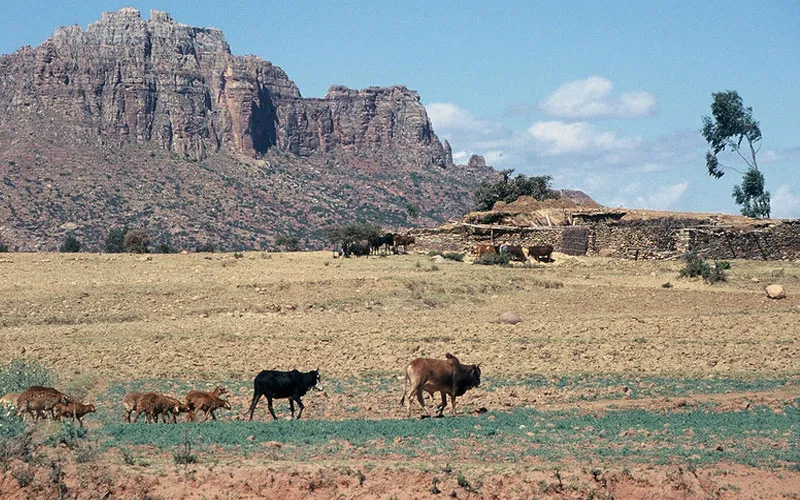“I really struggle. I worry for my children and family. I have to put food on the table. I don’t want my family to pass a day without food. Every day I have to work to provide food for the family. That’s what I do, I don’t have time for other things apart from this,” Abba Tesfalem recounts in the June 17 Trócaire report.
According to the Catholic charity, Africa is the most vulnerable place in the world to global climate change.
In Ethiopia, the charity details experiences of people whose battle for survival and the search for drinking water has become their primary job.
As drought worsens across Ethiopia, collecting water is the main task of the day for 23-year-old Abdellah from the Afar region of Ethiopia, the organization reports.
In the Afar region, people who are desperate to get water are forced to drink the water that has been contaminated by animal urine and fecal matter.
(Story continues below)
“Afar is extremely hot, the water is dirty, contaminated by monkey urine and the trek to collect it is horrendous,” Trócaire reports, adding, “Afar townspeople like Abdellah who are surviving on little, if not nothing, find it a challenging journey to navigate in the extreme heat and with no sustenance.”
Abdellah tells the organization that the journey for water is long, and explains, “We have to leave early from the village while it is still dark. We walk through the riverbed, then climb the mountains, then go down into a valley, then climb another mountain a little way to finally get to the water. That is the journey.”
“We drink water that monkeys go to the toilet in. It’s bad water. It makes us sick. You can see the animal dung at the other points of the journey. Monkeys and hyenas have been there,” Abdellah says.
Abdellah is acutely aware of the struggle he is faced with every day. It is not something he is just used to and without help or support his situation won’t improve.
He says that without water, it is difficult for many people to get jobs and for children to go to school. Instead of going to school, children are sent on long trips to search for water, he says.
“I don’t have any more words to express how hard it is,” Abdellah tells the charity organization, and adds, “I find it hard collecting water like this every day. I collect so little, then what I do get is not good. It has made us sick. What we need most and what we ask for is water.”
Ethiopia has already endured 10 major droughts since 1980, Trócaire reports, adding that for the past four decades, the average annual temperature in Ethiopia has been increasing by 0.37 degrees C per decade, with the majority of warming occurring during the second half of the 1990s.
The Catholic entity also reports that 85 percent of Ethiopians live in rural areas and most rely on subsistence farming for survival.
“With increasing changes to the climate, Ethiopians are struggling to farm. The drought is worsening, and people are going days without food and water,” Trócaire reports.
This year’s Desertification and Drought Day will focus on turning degraded land into healthy land.
Information on the United Nations Convention to Combat Desertification (UNCCD) to announce the celebration reads, “Restoring degraded land brings economic resilience, creates jobs, raises incomes and increases food security. It helps biodiversity to recover. It locks away the atmospheric carbon warming the Earth, slowing climate change.”
Restoring degraded land, according to UNCCD, can also lessen the impacts of climate change and underpin a green recovery from the COVID-19 pandemic.
Agnes Aineah is a Kenyan journalist with a background in digital and newspaper reporting. She holds a Master of Arts in Digital Journalism from the Aga Khan University, Graduate School of Media and Communications and a Bachelor's Degree in Linguistics, Media and Communications from Kenya's Moi University. Agnes currently serves as a journalist for ACI Africa.








